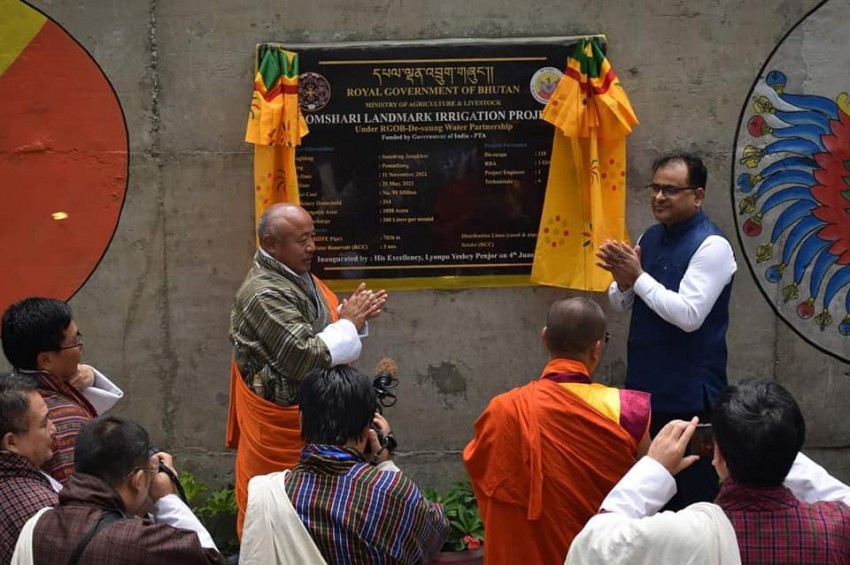People say that if Bhutan today has a high unemployment rate, it is due to lack of coordination and that almost everyone is responsible
According to the labour force survey report (LFSR) 2021, Bhutan’s unemployment rate is estimated at 4.8% and the youth unemployment rate 20.9%. Unemployment has been an economic concern for the country and no labour and human resources minister has been spared from being questioned what the ministry is doing about unemployment. It happened earlier this week as Karma Dorji, Minister, Ministry of Labour and Human Resources (MoLHR) was asked the same question. Apart from sharing what the MoLHR has done, Lyonpo also said that the responsibility to create jobs also falls on the private sector. Observers, the unemployed and others opine that creating jobs is indeed a joint responsibility of every ministry and agency and the issue has reached this level because of a lack of coordination between different stakeholders.
A civil servant who sought anonymity said in the tenure of all three different governments since 2008, legislators have been asking the MoLHR this question. “However, I have never seen or heard any legislator move a motion or bill on resolving the issue. The MoLHR may be the parent organization for creating employment, but our lawmakers are equally important to create a conducive environment such as getting in more foreign direct investment (FDI), strengthening the private sector and others,” he said.
Underlining that he has also read the LFSR 2021, he said “it says that most unemployed persons who said `looked for work’ or `looked for job and tried to establish a business’ preferred to work in the ‘government agency’ (78.2%) followed by jobs in ‘private business’ (11.6%) and ‘private limited company’ (3.2%) and that a similar pattern is observed among the youth unemployed also.” According to him, there should be a paradigm shift in the education system and from the very beginning, the notion of the civil service as the profession of choice should be erased.
On the MoLHR’s minister’s statement that the private sector should create jobs, he said the minister is absolutely right. He underlined that the National Statistics Bureau 2020, says that the private sector employs around 90,000 people (excluding those in farming), and the proportion of individuals employed, at 29%, is similar to that of 2004. “It shows that people are either not joining the private sector or the private sector is not making itself attractive.” A report that was published in Druk Journal, titled ‘Enabling the Private Sector for Economic Well-being’ says more than 50% of our firms employ a single individual, 30% employ only two or three individuals and fewer than 80 firms employ more than 100 individuals, he said, adding the private should do more. “The government should be firm with rules and regulations. Look at the tourism industry. More than 50 percent are ‘brief case’ tour operators, without offices and employees and the government des nothing,” he said.
Tandin Wangchuk, a private employee said that the private sector should be the main employer. “However, there should be policies for the private sector to grow. We have the foreign direct investment (FDI) policy and the Finance Minister recently reported in his budget speech that as of December 31, 2021, there were a total of 96 FDI projects worth Nu. 43,329.320 million, with the hospitality sector constituting 38 percent of these FDI projects followed by IT/ITES at 22 percent. Investments from within Asia remain the top source at 65 percent share. Within Asia, 55 percent of the projects in the country are from India followed by Singapore with 16 percent,” Tandin said. According to him, relevant agencies should study why FDI from the West and in other sectors are not flowing in. “I am not supporting the MoLHR or others. But these are responsibilities of other agencies and that is why solving unemployment should be a coordinated approach.”
According to Tandin, rather that helping the private sector, state owned enterprises (SOEs) are competing with the private sector. “I always think why the State Trading Corporation of Bhutan (STCBL) sells microwave ovens etc. They have money and should aim big. Similarly, there are other agencies in the furniture business,” he said. He also added that access to finance is a major problem. “How can the private sector progress,” he questioned.
However, everyone the paper spoke to, civil servants and private employees, agree that tackling unemployment is a joint venture. “All of us failed; the government, our elected legislators, the private sector and civil servants. Accepting that we failed is the first way to move ahead,” Tandin said.
A senior civil servant agrees that there has been lack of collaboration between ministries and stakeholders. “We have been saying that mis-match between supply and demand is one of the major causes of unemployment. And it is true. For instance, there has been either no study done or any kind of collaboration between the ministry of education and the MoLHR, due to which courses like Bachelors in media studies were offered in colleges under the Royal University of Bhutan (RUB), leading to students graduating with media background. But where is the market,” he said. “I have also heard that Bachelors in Himalayan Studies etc are courses offered. What will these graduates do,” he questioned. Further, he mentioned that agencies have not given importance to “significant studies” carried out. “It is yet again a question about collaboration. The National Statistical Board (NSB) diligently conducts very important surveys and studies every year and I may not be wrong to say that people and agencies concerned read the reports. For example, the ministry of economic affairs knows about FDIs coming into Bhutan, based on which the MoLHR should build skills. But I do not think that it has happened that way at all.”
On the other hand, he underlined that unemployment in Bhutan could be a matter of people not getting the work they want. According to the LFPR the unemployment rate for persons with master’s degree and above accounts for 1.3%. “I seriously do not believe that people with such qualifications will not get a job. It is possible that they do not get the job they want,” he said.
According to the labour force survey report (LFSR) 2021, Bhutan’s unemployment rate is estimated at 4.8% and the youth unemployment rate 20.9%. Unemployment has been an economic concern for the country and no labour and human resources minister has been spared from being questioned what the ministry is doing about unemployment. It happened earlier this week as Karma Dorji, Minister, Ministry of Labour and Human Resources (MoLHR) was asked the same question. Apart from sharing what the MoLHR has done, Lyonpo also said that the responsibility to create jobs also falls on the private sector. Observers, the unemployed and others opine that creating jobs is indeed a joint responsibility of every ministry and agency and the issue has reached this level because of a lack of coordination between different stakeholders.
A civil servant who sought anonymity said in the tenure of all three different governments since 2008, legislators have been asking the MoLHR this question. “However, I have never seen or heard any legislator move a motion or bill on resolving the issue. The MoLHR may be the parent organization for creating employment, but our lawmakers are equally important to create a conducive environment such as getting in more foreign direct investment (FDI), strengthening the private sector and others,” he said.
Underlining that he has also read the LFSR 2021, he said “it says that most unemployed persons who said `looked for work’ or `looked for job and tried to establish a business’ preferred to work in the ‘government agency’ (78.2%) followed by jobs in ‘private business’ (11.6%) and ‘private limited company’ (3.2%) and that a similar pattern is observed among the youth unemployed also.” According to him, there should be a paradigm shift in the education system and from the very beginning, the notion of the civil service as the profession of choice should be erased.
On the MoLHR’s minister’s statement that the private sector should create jobs, he said the minister is absolutely right. He underlined that the National Statistics Bureau 2020, says that the private sector employs around 90,000 people (excluding those in farming), and the proportion of individuals employed, at 29%, is similar to that of 2004. “It shows that people are either not joining the private sector or the private sector is not making itself attractive.” A report that was published in Druk Journal, titled ‘Enabling the Private Sector for Economic Well-being’ says more than 50% of our firms employ a single individual, 30% employ only two or three individuals and fewer than 80 firms employ more than 100 individuals, he said, adding the private should do more. “The government should be firm with rules and regulations. Look at the tourism industry. More than 50 percent are ‘brief case’ tour operators, without offices and employees and the government des nothing,” he said.
Tandin Wangchuk, a private employee said that the private sector should be the main employer. “However, there should be policies for the private sector to grow. We have the foreign direct investment (FDI) policy and the Finance Minister recently reported in his budget speech that as of December 31, 2021, there were a total of 96 FDI projects worth Nu. 43,329.320 million, with the hospitality sector constituting 38 percent of these FDI projects followed by IT/ITES at 22 percent. Investments from within Asia remain the top source at 65 percent share. Within Asia, 55 percent of the projects in the country are from India followed by Singapore with 16 percent,” Tandin said. According to him, relevant agencies should study why FDI from the West and in other sectors are not flowing in. “I am not supporting the MoLHR or others. But these are responsibilities of other agencies and that is why solving unemployment should be a coordinated approach.”
According to Tandin, rather that helping the private sector, state owned enterprises (SOEs) are competing with the private sector. “I always think why the State Trading Corporation of Bhutan (STCBL) sells microwave ovens etc. They have money and should aim big. Similarly, there are other agencies in the furniture business,” he said. He also added that access to finance is a major problem. “How can the private sector progress,” he questioned.
However, everyone the paper spoke to, civil servants and private employees, agree that tackling unemployment is a joint venture. “All of us failed; the government, our elected legislators, the private sector and civil servants. Accepting that we failed is the first way to move ahead,” Tandin said.
A senior civil servant agrees that there has been lack of collaboration between ministries and stakeholders. “We have been saying that mis-match between supply and demand is one of the major causes of unemployment. And it is true. For instance, there has been either no study done or any kind of collaboration between the ministry of education and the MoLHR, due to which courses like Bachelors in media studies were offered in colleges under the Royal University of Bhutan (RUB), leading to students graduating with media background. But where is the market,” he said. “I have also heard that Bachelors in Himalayan Studies etc are courses offered. What will these graduates do,” he questioned. Further, he mentioned that agencies have not given importance to “significant studies” carried out. “It is yet again a question about collaboration. The National Statistical Board (NSB) diligently conducts very important surveys and studies every year and I may not be wrong to say that people and agencies concerned read the reports. For example, the ministry of economic affairs knows about FDIs coming into Bhutan, based on which the MoLHR should build skills. But I do not think that it has happened that way at all.”
On the other hand, he underlined that unemployment in Bhutan could be a matter of people not getting the work they want. According to the LFPR the unemployment rate for persons with master’s degree and above accounts for 1.3%. “I seriously do not believe that people with such qualifications will not get a job. It is possible that they do not get the job they want,” he said.














